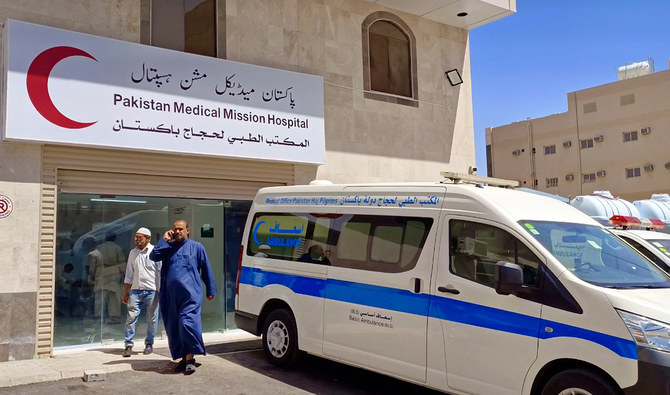ISLAMABAD: Pakistan has established two hospitals and 10 dispensaries in the holy cities of Makkah and Madinah to provide health care for Hajj pilgrims, the head of the country’s medical mission in Saudi Arabia confirmed on Thursday, as hundreds of pilgrims arrive daily in the Kingdom ahead of the annual Islamic pilgrimage.
Pakistan’s Ministry of Religious Affairs (MoRA) has confirmed that more than 16,000 pilgrims from the country have arrived in Saudi Arabia weeks before Hajj 2024 begins.
This year, 179,210 Pakistanis will perform Hajj under government and private schemes. Pakistan kicked off a month-long flight operation last week, with five airlines— PIA, Saudi Airlines, Airblue, Serene Air, and Air Sial— operating 259 flights from eight major Pakistani cities to Jeddah and Madinah until June 9.
“We have established two main hospitals and ten dispensaries in Makkah and Madinah,” Brig. Jamil Lakhiar, the director of Pakistan’s Hajj Medical Mission, told Arab News from Madinah.
“One main hospital and eight dispensaries are in Makkah, while one hospital and two dispensaries are in Madinah,” he shared.

A doctor performs treatment at the Pakistan Medical Mission Hospital in Madinah on May 16, 2024, as Pakistani Hajj Mission sets up medical facilities for Pakistani pilgrims in Saudi Arabia ahead of annual Islamic pilgrimage. (Photo courtesy: Pakistan Hajj Medical Mission)
He said Pakistani pilgrims’ residences in Makkah have been divided into nine zones. One zone has the main hospital in it while each of the remaining eight zones have a dispensary each.
Lakhiar said around 400 doctors and paramedics have been selected this year for the Hajj Medical Mission, who were gradually arriving in Saudi Arabia with pilgrims to perform their duties.
The Pakistani official said members of the medical mission were selected by the religion ministry on a pre-defined formula based on merit. He said the mission comprised 70 percent of civilians while 30 percent were selected from the armed forces.
“At the hospitals, we have specialists including cardiologists, gynecologists, pediatricians, pulmonologists, dentists, and others,” Lakhiar said. He said both hospitals were equipped with X-ray, ultrasound, and lab testing facilities where minor procedures could be performed.

People wait for their treatment at the Pakistan Medical Mission Hospital in Madinah on May 16, 2024, as Pakistani Hajj Mission sets up medical facilities for Pakistani pilgrims in Saudi Arabia ahead of annual Islamic pilgrimage. (Photo courtesy: Pakistan Hajj Medical Mission)
He said patients suffering from serious ailments are referred to Saudi hospitals for further treatment.
“In every dispensary, one doctor, two paramedics and one pharmacist will be present round the clock in different shifts,” Lakhiar said, adding that each dispensary has an ambulance as well.
“So far in Madinah, we have treated more than 500 Pakistani pilgrims for various minor issues,” he disclosed.
The official said all treatments, tests and medicines were provided free of cost to pilgrims.
“Every doctor and paramedic has to return after 45 days, that is why their arrival is staggered so that when one leaves, there will always be others available to replace them until the last flight,” Lakhiar said.

A paramedic prescribes medicines during a check-up at the Pakistan Medical Mission Hospital in Madinah on May 16, 2024, as Pakistani Hajj Mission sets up medical facilities for Pakistani pilgrims in Saudi Arabia ahead of annual Islamic pilgrimage. (Photo courtesy: Pakistan Hajj Medical Mission)
















